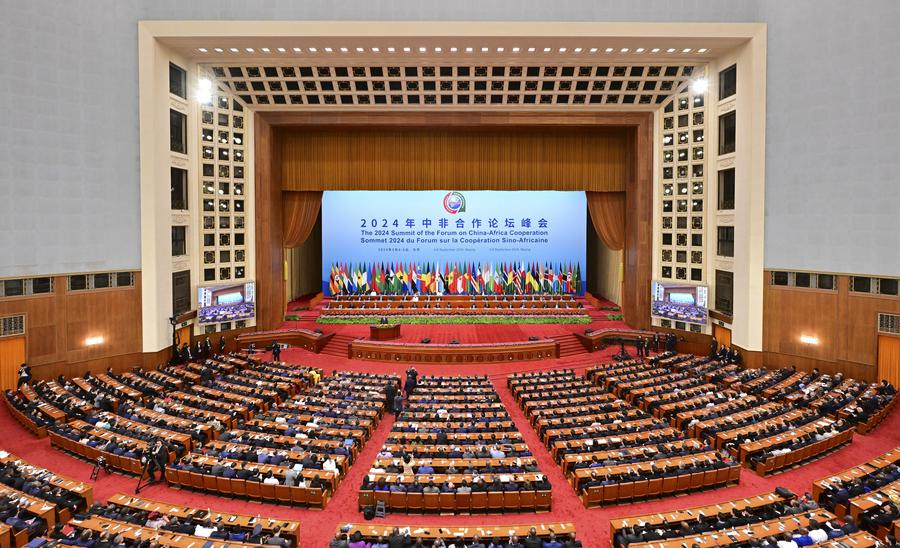
 0 Comment(s)
0 Comment(s) Print
Print E-mail Xinhua, September 10, 2024
E-mail Xinhua, September 10, 2024

The 2024 Summit of the Forum on China-Africa Cooperation (FOCAC) opens in Beijing, capital of China, Sept. 5, 2024. [Photo/Xinhua]
During his recent talks with Comorian President Azali Assoumani in Beijing, Chinese President Xi Jinping brought up a Chinese TV series that has resonated deeply in both China and Africa.
Known internationally as Minning Town, the series carries the more poetic Chinese title, Shan Hai Qing, which means "Friendship Across the Mountains and the Sea." This title reflects the spirit of cooperation between China's coastal and mountainous regions in their shared battle against poverty.
Set in the 1990s, the TV series is based on real-life events in Xihaigu, a remote and impoverished area in northwest China's Ningxia Hui Autonomous Region. The series depicts the relocation of villagers from the barren mountains to a more hospitable area called Minning, located near the Yellow River, with assistance from east China's Fujian, a wealthier coastal province in eastern China.
It is an epic example of China's arduous journey against extreme poverty, and such experiences have significantly shaped its development model and worldview.
Having successfully lifted 800 million people out of poverty, China has acquired firsthand knowledge of the transformative impact of poverty alleviation on a country's development and long-term stability. This experience has also strengthened China's belief that eradicating poverty is not only a domestic priority but also a global imperative.
The show's popularity in Africa highlights the growing cultural exchange and deepening development ties between China and African nations. It is also emblematic of China's experience in poverty alleviation.
China's victory in poverty reduction resonates particularly in Africa, where many nations view China's efforts as a source of inspiration in their own quests to eradicate poverty and promote sustainable development.
One example of China's commitment to helping African countries tackle poverty is the transfer of Juncao technology, often referred to as the Chinese hybrid grass technology. Originally developed in China, this innovative technology uses a type of hybrid grass to cultivate edible and medicinal mushrooms, while also serving as animal feed and a natural method for controlling soil erosion.
In the TV series based on true stories, Juncao technology helps the resettled farmers of Minning Town develop the mushroom industry and get rid of poverty. Juncao technology has been introduced to various African countries, where arable land is limited and food insecurity is prevalent.
China's commitment to helping African countries address the thorny issue of poverty extends beyond technology sharing. Through targeted investments, knowledge sharing, and capacity building, China is helping African nations develop the infrastructure, industries, and human resources needed to break the cycle of poverty.
The China-proposed Belt and Road Initiative is one of the key channels through which this support flows. By building critical infrastructure such as railways, highways, and energy projects, China is not only improving connectivity across Africa but also creating opportunities for economic growth and employment, helping African countries integrate into global supply chains.
China's anti-poverty efforts in Africa are also manifested in education and healthcare initiatives. By investing in schools, vocational training centers, and healthcare facilities, China is working with African nations to build the foundation for long-term human capital development. This focus on education and health not only improves the well-being of the locals but also equips individuals with the skills and opportunities needed to escape poverty.
In a keynote speech at the opening ceremony of the 2024 Summit of the Forum on China-Africa Cooperation on Thursday, Xi said that China stands ready to work with Africa to implement 10 partnership action plans in the next three years to jointly advance modernization.
These measures are specifically designed to help Africa combat poverty and foster development by focusing on areas such as trade prosperity, industrial chain cooperation, and agricultural advancement. The plans will also emphasize improving livelihoods, enhancing connectivity, promoting green development, and strengthening health systems, all aimed at lifting communities out of poverty and driving modernization across the continent.
As China and Africa move forward together, this enduring friendship stands as a testament to their shared vision: a future where the mountains of poverty are leveled, and the seas of opportunity are navigated hand in hand, leading to a horizon of shared growth and development.